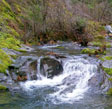| This article was published in the Independent Coast Observer on November 1, 2002. |
Courtesy Independent Coast Observer, Gualala, CA
At the request of Assembly Member Virginia Strom-Martin (D-Duncans Mills), senior Water Board officials explained the water bag protest process to the public at meetings in Elk and Garberville this week.
The Elk meeting Monday evening was moderated by Sea Rancher Jim Jordan. Questions were fielded by Chief Counsel Barbara Katz and by Mike Floyd, who is Kathryn Gaffney’s boss. The Albion and Gualala water bag proposals reside on Gaffney’s desk.
They could only answer questions on the protest process, not on the substance of the proposals.
The Water Board will give water entrepreneur Ric Davidge one more chance to comply by placing legal notices in newspapers. If he does not, they will deny his application without prejudice, which means he could pay the fees and file again.
“This is a shorthand look at the process which may be helpful,” Katz said. “One thing about protests is that you have to be willing to provide evidence at a hearing,” she said, adding that people can write a letter of opposition or a policy statement.
Gaffney told the ICO on Tuesday that protests not accepted by the SWRCB will be retained in the files as either letters of opposition or policy statements. She said it will take a few weeks to reconcile mailing lists and issue public notice opening a new 60-day protest period.
Katz said that protests shall be accompanied by a statement of facts supporting the allegations. There is no form for a statement of facts; it can be a sheet written in lay terms and sent with the protest form. The applicant does not need to prove his case up front and neither do protestants. Both must be prepared to respond to SWRCB requests for more information, she said.
Davidge has been replying to such requests for two years. Floyd said there is a lot more to be done on this application and “that is common.”
Assembly Member Pat Wiggins (D – Santa Rosa) wrote a new law that requires a study by the University of California before permits can be granted, but provides no funds.
“That study isn’t going to happen right away,” said Katz. If no funds are appropriated Davidge may have to pay for the study.
In any event he will have to pay for the California Environmental Quality Act study. The SWRCB usually hires a consultant for the CEQA process which the applicant has to pay for.
Floyd said the information they have about the project is not the complete picture.
 Friends of Gualala River Protecting the Gualala River watershed and the species living within it
Friends of Gualala River Protecting the Gualala River watershed and the species living within it
